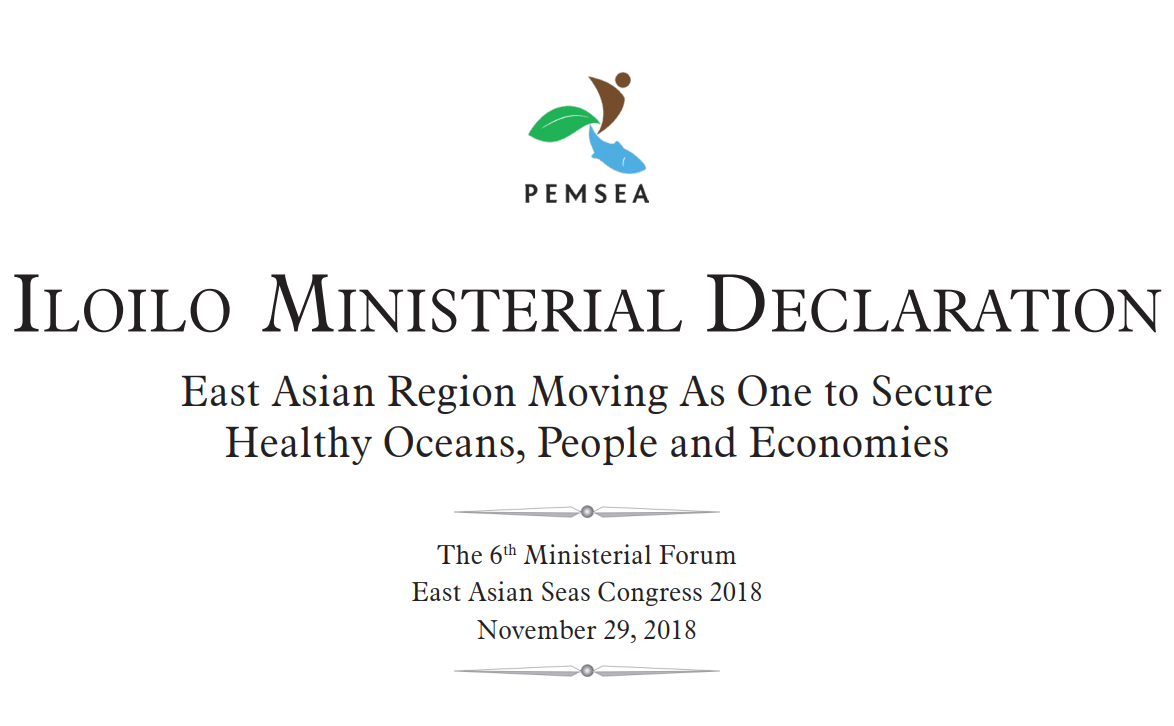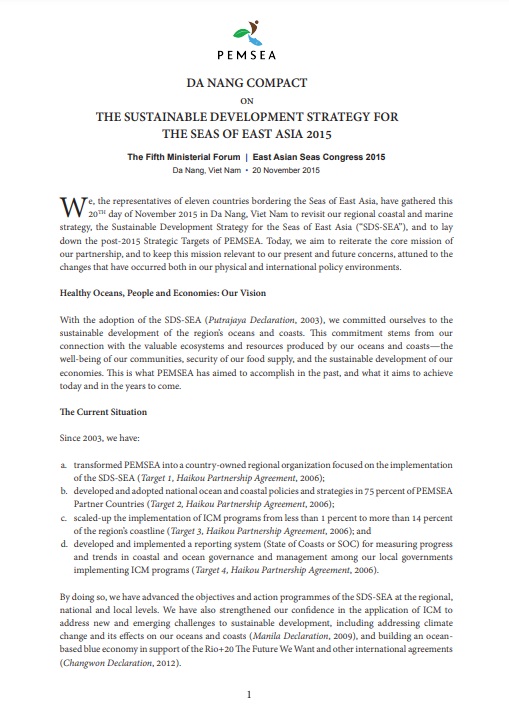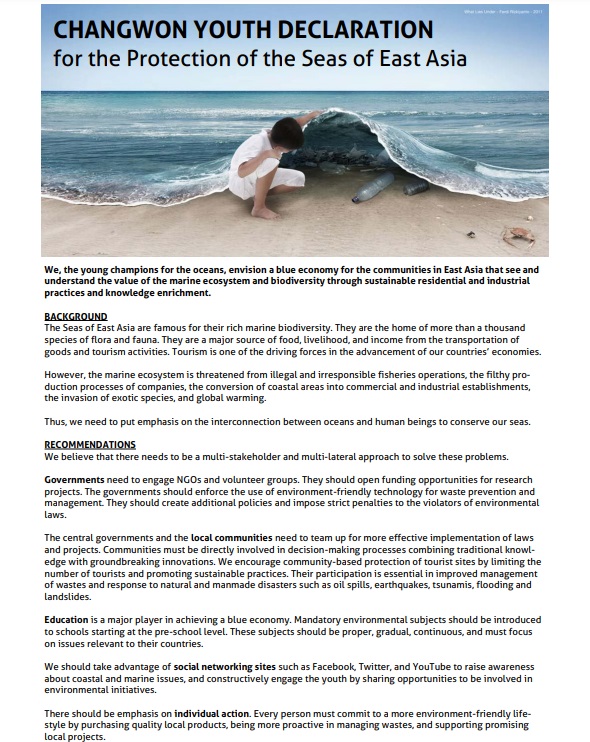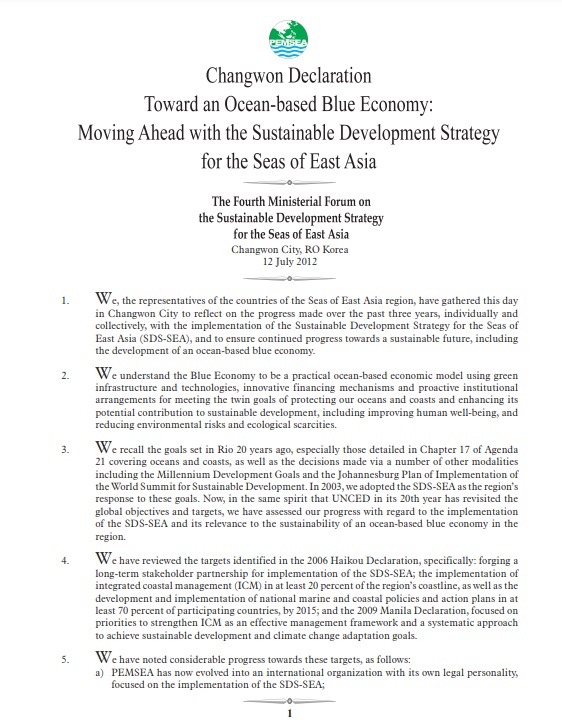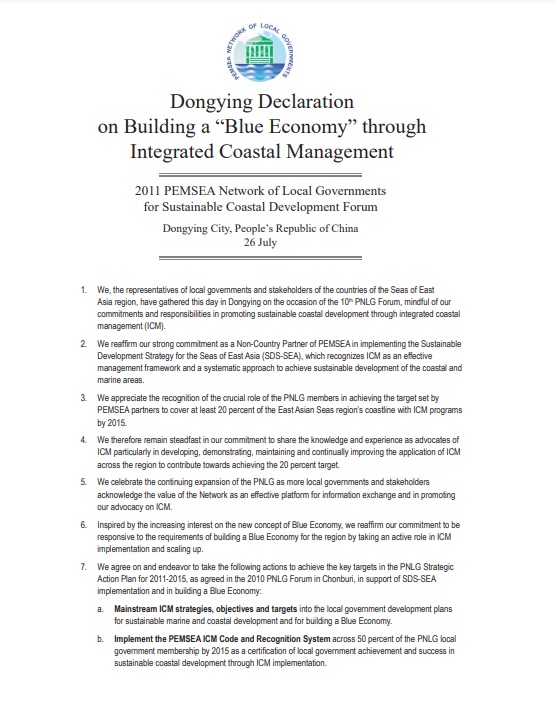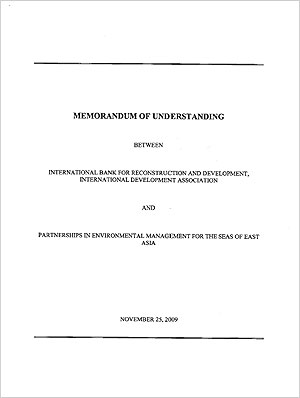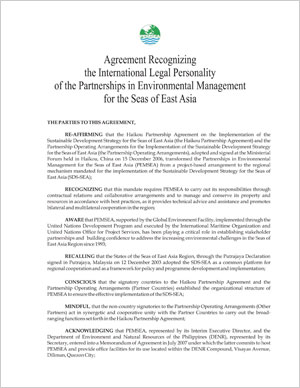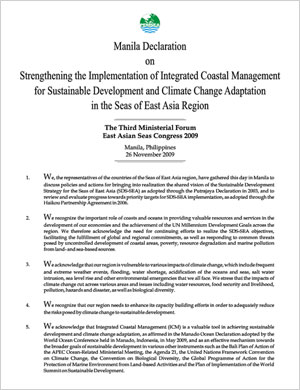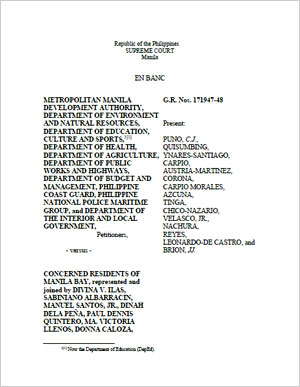
Breadcrumb
-
Iloilo Ministerial Declaration
The Iloilo Ministerial Declaration was signed by Ministers from PEMSEA country partners on 29 November 2018 during the Sixth Ministerial Forum, part of the Sixth East Asian Seas Congress.
-
Da Nang Compact on the Sustainable Development Strategy for the Seas of East Asia 2015
Signed during the Fifth Ministerial Forum on the Sustainable Development Strategy for the Seas of East Asia on 20 November 2015, the Da Nang Compact revisits and reaffirms the regional coastal and marine strategy, the Sustainable Development Strategy for the Seas of East Asia (SDS-SEA), and lays down the post-2015 Strategic Targets of PEMSEA.
Ministers and head of delegations from 11 countries of the East Asian Seas (EAS) signed the Compact. The Compact is the region’s support for the United Nations Sustainable Development Goals (SDGs) and other relevant international and regional commitments related to coasts and oceans.
With the signing, Ministers and head of delegations from Cambodia, PR China, DPR Korea, Indonesia, Japan, Lao PDR, the Philippines, RO Korea, Singapore, Timor-Leste, and Viet Nam adopted the SDS-SEA 2015. The SDS-SEA 2015, is an updated version of the SDS-SEA 2003, which incorporates strategies, objectives and action programmes for climate change adaptation, disaster risk reduction, and conservation of marine and coastal biodiversity, among others. The SDS-SEA 2015 was adopted as a common platform for regional cooperation, and as a framework for policy and programme development and implementation, at the national and local level.
The Compact aimed to reiterate the core mission of the partnership and keep the mission relevant to present and future concerns, attuned to the changes that have occurred both in our physical and international policy environments. Through the Da Nang Compact, the 11 countries of the PEMSEA committed to achieve medium-term targets as set forth in the Post-2015 Strategic Targets of PEMSEA:
TARGET 1: By 2017, a self-sustaining PEMSEA Resource Facility managing and coordinating a suite of products, services and financing mechanisms for advancing SDS-SEA implementation at the regional, national and local levels.
TARGET 2: By 2018, a regional State of Oceans and Coasts reporting system to monitor progress, impacts and benefits, and to continually improve planning and management of SDS-SEA implementation.
TARGET 3: By 2021, national coastal and ocean policies, and supporting legislation and institutional arrangements set up and functional in 100% of PEMSEA Partner Countries, consistent with international environmental and sustainable development commitments and based on best available scientific information.
TARGET 4: By 2021, ICM programs for sustainable development of coastal and marine areas covering at least 25% of the region’s coastline and contiguous watershed areas, supporting national priorities and commitments under the UN SDGs, UNFCCC, Aichi Biodiversity Targets, UNISDR Post-2015 Framework for Disaster Risk Reduction, and other relevant environmental and sustainable development targets subscribed to by PEMSEA Partner Countries.
The SDS-SEA 2015 will be guiding documents for the work of the countries of EAS region in the journey of achieving the targets. PEMSEA will monitor the progress and achievements of the Da Nang Compact using the regional and local State of the Coasts reporting system.
-
Changwon Youth Declaration for the Protection of the Seas of East Asia
The Changwon Youth Declaration was drafted and agreed upon by the delegates of the Third East Asian Seas Youth Forum (YF3), held in Changwon City, Republic of Korea from July 8 to 13, 2012.
The declaration was presented during the closing ceremonies of the International Conference of the East Asian Seas Congress 2012.
-
Changwon Declaration Toward an Ocean-based Blue Economy : Moving Ahead with the Sustainable Development Strategy for the Seas of East Asia
Signed during the Fourth Ministerial Forum on the Sustainable Development Strategy for the Seas of East Asia on 12 July 2012, the Changwon Declaration reflects on the progress made over the past three years with the implementation of the SDS-SEA, and ensures the continued progress towards a sustainable future, including the development of an ocean-based blue economy. Ministers from 10 countries of the East Asian Seas (EAS) signed the declaration. The Declaration is the region’s support for the implementation of theRio+20 Outcomes embodied in "The Future We Want," and other relevant international and regional commitments related to coasts and oceans. With the signing, Ministers and senior representatives from Cambodia, PR China, Indonesia, Japan, Lao PDR, the Philippines, RO Korea, Singapore, Timor-Leste, and Viet Nam adopted the Five-Year Regional Implementation Plan for the Sustainable Development Strategy for the Seas of East Asia (SDS-SEA) for 2012-2016. Thailand participated as an observer. The Declaration enables the development of an ocean-based blue economy in the region through the strengthened support for SDS-SEA implementation and other relevant initiatives. Under the Changwon Declaration, PEMSEA as the SDS-SEA implementing arm, targets the following changes in coastal and marine governance: (a) a self-sustained regional partnership mechanism for the implementation of the SDS-SEA; and (b) national coastal and ocean policies and supporting institutional arrangements in place in at least 70% of Partner Countries.
-
Dongying Declaration on Building a "Blue Economy" through Integrated Coastal Management
The Dongying Declaration on Building a "blue economy" through ICM embodies the commitment of the PEMSEA Network of Local Governments for Sustainable Coastal Development (PNLG) to implement the PNLG Strategic Action Plan (SAP) as well the commitment of the PNLG as a PEMSEA Non-Country Partner to implement the SDS-SEA. The Dongying Declaration was adopted in Dongying City, People's Republic of China last July 26, 2011.
-
Agreement between IBRD, IDA and PEMSEA in Environmental Management
This memorandum of understanding, also known as the Strategic Partnership Agreement, reflects the understanding between the International Bank for Reconstruction and Development (IBRD) and the International Development Association (IDA), collectively known as the World Bank, and PEMSEA, to collaborately focus on land-based pollution reduction, integrated coastal management, climate change adaptation, and public-private partnerships.
-
Agreement Recognizing the International Legal Personality of the Partnerships in Environmental Management for the Seas of East Asia
This agreement, signed by eight countries in 26 November 2009 in Manila, recognizes the international legal personality of PEMSEA. In accordance to this recognition, PEMSEA gains the legal capacity to contract, hold and dispose of property, and such capacity as may be necessary for the exercise of its functions and the fulfillment of its purposes. The agreement likewise stipulates the organizational structure of PEMSEA, the depositary of the agreement, and other articles relevant to the agreement.
-
Manila Declaration on Strengthening the Implementation of the Integrated Coastal Management for Sustainable Development and Climate Change Adaptation in the Seas of East Asia Region
Signed by the ministers of 11 countries during the Third Ministerial Forum in Manila on 26 November 2009, the Manila Declaration on Strengthening the Implementation of the Integrated Coastal Management for Sustainable Development and Climate Change Adaptation in the Seas of East Asia Region (Manila Declaration) acknowledges the need for continuing efforts to realize the SDS-SEA objectives, facilitating the fulfillment of global and regional commitments, as well as responding to common threats posed by uncontrolled development of coastal areas, poverty, resource degradation and marine pollution from land- and sea-based sources. The declaration also calls on PEMSEA, as the regional mechanism for the implementation of the SDS-SEA, to undertake the development of the Implementation Plan for the SDS-SEA in 2010 for consideration by countries, to facilitate the scaling up of ICM programmed in countries across the region and to promote regional cooperation in education and training activities related to ICM and climate change adaptation, taking into account the Haikou Partnership Agreement.
-
Republic of the Philippines Supreme Court Decision Ordering the Clean-up of Manila Bay
This decision of the Supreme Court of the Republic of the Philippines orders several various Philippine government agencies to clean up, rehabilitate, and preserve Manila Bay, and restore and maintain its waters to SB level to make them fit for swimming, skin-diving, and other forms of contact recreation.
